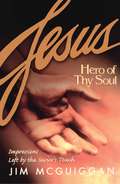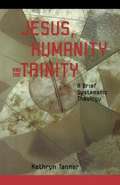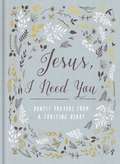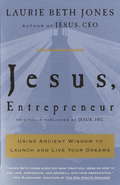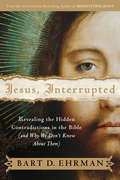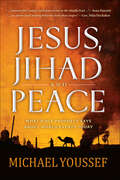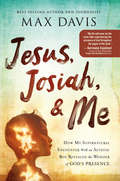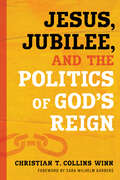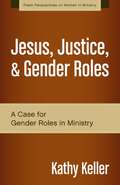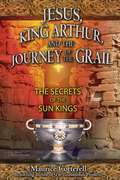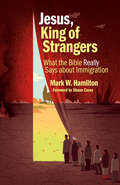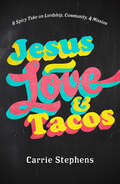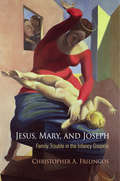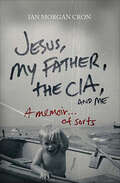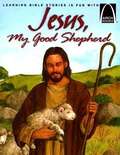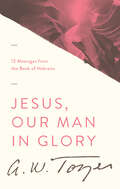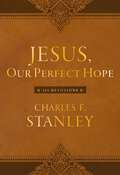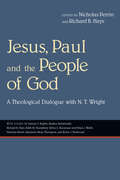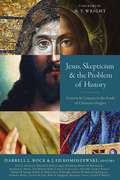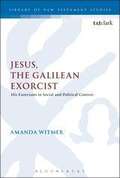- Table View
- List View
Jesus, Hero of Thy Soul
by Jim McguigganAll of us yearn for a hero... someone to spark a flame in our souls, someone to inspire us to live beyond ourselves, someone to help us live up to the potential our Creator has placed within us. Jesus is the hero in your soul. His awe-inspiring love enables you to reach beyond your limitations and become the person God created you to be. Your heart will soar as you read Jim McGuiggan's stirring devotional and inspirational stories about everyday men and women who have been touched by the Savior's hand and who live to reflect his nature. Allow the Rescuer to touch your life -- you'll be forever changed by the impressions left by the Savior's touch.
Jesus, Humanity and the Trinity: A Brief Systematic Theology
by Kathryn TannerWith simplicity and elegance, Tanner sketches an historically informed vision of the faith: Chapter 1 recovers strands of early Christian accounts of Jesus and his significance for a very different age. Chapter 2 situates Christology in a religious vision of the whole cosmos, while chapter 3 lays out the ethical and political implications of the vision. Chapter 4 speculates about the "end" of things in Christ. Tanner's work was developed from the Scottish Journal of Theology Lectures in 1999 in Edinburgh.
Jesus, I Need You: Devotions From Your Heart to His
by ZondervanThis beautifully packaged devotional is unique, written in the form of a letter from the reader to Jesus. Each devotion focuses on topics such as needing to slow down, stress less, rely on His strength, make wise decisions, further His kingdom, as well as praise and thank Jesus. Arranged topically, each entry features a letter to Jesus that reminds the reader that we are not alone with our triumphs or tragedies, and that Jesus walks every step of every day with us. Every devotion has a Bible verse to reflect on as well as a takeaway message for the day, to provide comfort, encouragement, and strength for the reader. At the end of each devotion, there is space for the reader to record their thoughts, prayers, or even write their own letter to Jesus. This book puts life in perspective each day in a personal and intimate way.
Jesus, I Need You: Honest Prayers from a Trusting Heart
by ZondervanGood times. Bad times. In-between times. When your daily ordeals threaten to overwhelm you, the simple prayer “Jesus, I need You”offers peace and rest. Whether you’re experiencing a season of heartache or a season of joy, a time of questioning or a time of deep gratitude, the vulnerable prayers featured throughout will meet you where you are. With space for journaling, Jesus, I Need You will quiet your mind and heart as you discover the Lord’s faithfulness and lovingkindness.Find the comfort, hope, and celebration you seek as you ground your faith in the Savior who can be trusted in all circumstances.
Jesus, Inc.: The Visionary Path, an Entrepreneur's Guide to True Success
by Laurie Beth JonesHe didn't work for money. He was willing to walk away. He invested His emotions wisely. He did sweat the small stuff. Beyond work, beyond entrepreneurism, there is "spiritreneurism" -- work that allows you to do well by doing right. In Jesus, Inc. , Laurie Beth Jones, bestselling author of Jesus, CEO, shows you how to find soul satisfaction in your work. In Jesus, CEO, Laurie Beth Jones offered an irresistible motivational proposition: If Jesus could change the world with a team of just twelve men, shouldn't he have something to teach us all about managing our teams? The answer was a resounding yes, and it made the book a bestseller. Now, in Jesus, Inc., Jones shows that there is no contradiction between earning a comfortable living even as you use your job to promote your deepest spiritual and personal beliefs. How exactly is this possible? Using timeless wisdom from the Bible and anecdotes from her own life and consulting career, as well as tales from the best and worst work situations in today's rapidly changing business environment, she reveals how you can inspire yourself and your coworkers to use your highest gifts to benefit the bottom line. Never before have so many individuals been willing to launch new businesses, and never before have so many of them been looking for a new business model. Here, in Jesus, Inc. , entrepreneurs and "spiritreneurs" will find timeless wisdom and biblical principles that will help create a new world of joyful and satisfying work. A genius at making the powerful familiar, Jones offers a commandingly fresh and compelling case for Jesus as a role model for modern times. Rich with humor, exercises, meditations, and case histories, Jesus, Inc. is essential reading for those seeking to put their spirituality to practical use.
Jesus, Interrupted
by Bart D. EhrmanPicking up where Bible expert Bart Ehrman's New York Times bestseller Misquoting Jesus left off, Jesus, Interrupted addresses the larger issue of what the New Testament actually teaches--and it's not what most people think. Here Ehrman reveals what scholars have unearthed:The authors of the New Testament have diverging views about who Jesus was and how salvation worksThe New Testament contains books that were forged in the names of the apostles by Christian writers who lived decades laterJesus, Paul, Matthew, and John all represented fundamentally different religionsEstablished Christian doctrines--such as the suffering messiah, the divinity of Jesus, and the trinity--were the inventions of still later theologiansThese are not idiosyncratic perspectives of just one modern scholar. As Ehrman skillfully demonstrates, they have been the standard and widespread views of critical scholars across a full spectrum of denominations and traditions. Why is it most people have never heard such things? This is the book that pastors, educators, and anyone interested in the Bible have been waiting for--a clear and compelling account of the central challenges we face when attempting to reconstruct the life and message of Jesus.
Jesus, Interrupted: Revealing the Hidden Contradictions in the Bible (And Why We Don't Know About Them)
by Bart D. EhrmanPicking up where Bible expert Bart Ehrman's New York Times bestseller Misquoting Jesus left off, Jesus, Interrupted addresses the larger issue of what the New Testament actually teaches--and it's not what most people think. Here Ehrman reveals what scholars have unearthed: The authors of the New Testament have diverging views about who Jesus was and how salvation works The New Testament contains books that were forged in the names of the apostles by Christian writers who lived decades later Jesus, Paul, Matthew, and John all represented fundamentally different religions Established Christian doctrines--such as the suffering messiah, the divinity of Jesus, and the trinity--were the inventions of still later theologians These are not idiosyncratic perspectives of just one modern scholar. As Ehrman skillfully demonstrates, they have been the standard and widespread views of critical scholars across a full spectrum of denominations and traditions. Why is it most people have never heard such things? This is the book that pastors, educators, and anyone interested in the Bible have been waiting for--a clear and compelling account of the central challenges we face when attempting to reconstruct the life and message of Jesus.
Jesus, Jihad and Peace: What Bible Prophecy Says About World Events Today
by Michael YoussefJudaism, Christianity, and Islam all feature parallel accounts of the "end times," and all three accounts feature a messianic Savior, an apocalyptic final war between good and evil, and a central role for the city of Jerusalem. Do these three "end times" scenarios intersect in some way? In a world that cries out for peace, which will prevail -- Jesus or jihad?
Jesus, Josiah, and Me: How My Supernatural Encounter With an Autistic Boy Revealed the Wonder of God's Presence
by Max DavisFROM BEST-SELLING AUTHOR AND AWARD-WINNING JOURNALIST MAX DAVIS You can know undeniably that Jesus is real and fully-present, even when your feelings and circumstances scream the opposite. Best-selling author and journalist Max Davis had his life turned upside down when he experienced a supernatural encounter with a nine-year-old, nonverbal, autistic boy named Josiah Cullen. This special boy, who lived in Minnesota, had prophetic visions and messages from God about Max, who lived in Louisiana, even though the two had never met or had any contact. These messages, which Josiah typed with one finger, were packed with amazing biblical insight and highly detailed specifics about Max&’s life—details that Josiah could not possibly have known unless they were revealed to him by the Holy Spirit. As a skeptical journalist who pursues truth, Max gained undeniable evidence that God is real and knows us personally. Even more compelling is that the prophetic messages centered around Max&’s personal prayer life. Just like in John 1:48 when Jesus let Nathanael know He saw him praying under the fig tree, through Josiah, God was letting Max know that He sees us when we pray too, even though circumstances often scream the opposite. Life can be brutal, and we tend to equate pain and struggle with the absence of God. Yet nothing could be further from the truth! Regardless of how things may appear, Jesus is real, alive, and fully present, and living in that awareness changes everything. In Jesus, Josiah, and Me, Max Davis shows you that it is possible to encounter the living Jesus in a richer and more tangible way—that you can cultivate an awareness of His reality and know your prayers are affecting outcomes. More than an amazing account of Max&’s encounter with an autistic boy that sparks faith and hope, it&’s a story that unveils the mystery of experiencing God&’s presence and power like never before! This book will encourage your faith by showing you that you can encounter the living Jesus in a richer and more tangible way. It will unveil the mystery of experiencing God&’s presence and power like never before.
Jesus, Jubilee, and the Politics of God’s Reign (Prophetic Christianity Series (PC))
by Christian T. Collins WinnWhat if the kingdom of God is not a place, but a person? In this timely monograph, Christian T. Collins Winn argues that the kingdom of God is Jesus himself. Drawing on a wide breadth of liberation theology, Jesus, Jubilee, and the Politics of God&’s Reign amplifies the echoes of salvation history in contemporary struggles for social justice. Collins Winn demonstrates how the institution of the Jubilee year exemplifies the kingdom of God. A semicentennial celebration prescribed in the book of Leviticus, Jubilee prescribed the redistribution of wealth and freeing of prisoners. Hope for Jubilee persists in apocalyptic rhetoric, from the exhortations of Old Testament prophets to those of modern progressives. Likewise, Jesus&’s ministry, passion, and resurrection convey the justice of Jubilee and urgency of apocalypse. His conquest over death represents the ultimate vindication of the oppressed in the kingdom of God, an &“outpouring of Spirit&” seen today in continuing restorative efforts by oppressed communities in the face of death-dealing institutions. Historically informed and passionately written, Jesus, Jubilee, and the Politics of God&’s Reign challenges readers to find Jesus in the marginalized persons of our own time.
Jesus, Justice, and Gender Roles: A Case for Gender Roles in Ministry (Fresh Perspectives on Women in Ministry)
by Kathy KellerIn this original digital short, author and co-founder of Redeemer Presbyterian Church Kathy Keller recounts her experience growing up in “gender-neutral” home. “My first encounter with the ideas of [male] headship and [female] submission,” she writes, “was both intellectually and morally traumatic.” Yet Keller came to adopt the view that men and women have different roles in marriage and ministry, and that fulfilling such roles pleases God and leads to greater personal fulfillment. In this unapologetic but nuanced piece, Keller presents a caring and careful case for biblical gender differences and the complementarian view of women in ministry. At the same time, she encourages women to teach and lead in the church in ways that may startle some complementarians. Readers on both sides of this hot-button topic will be challenged by her ministry-tested and thoroughly Scriptural perspective.
Jesus, King Arthur, and the Journey of the Grail: The Secrets of the Sun Kings
by Maurice CotterellReveals how the super-science of the sun and the higher orders of spirituality are concealed and contained in the Holy Grail• Connects the discovery of 4,000-year-old Celtic mummies in China with the transmission of this ancient knowledge• Documents the truth of the Holy Grail’s connection with King Arthur and Joseph of Arimathea• Confirms the pedigree of the Grail using secret information from the Mayan Pyramid of Inscriptions in Mexico and the Gateway of the Sun in PeruUsing the same knowledge that enabled him to break the codes of the Mayas, Peruvians, Egyptians, and Chinese, Maurice Cotterell now follows the migration of the Celts 4,000 years ago from Asia, across Europe, to Ireland. His account of this epic journey together with his knowledge of the secret codes of the Celts help him to identify and locate the Holy Grail, the actual cup used by Christ and his disciples at the Last Supper. The author explains the true story of the Grail: how it contains the secret super-science of the sun and the higher orders of spirituality; how it was carried to England by Joseph of Arimathea; how in A.D. 453 it was found by King Arthur, who engraved it with the same esoteric information found on the Pyramid of Inscriptions in Palenque, Mexico, and the Gateway of the Sun at Tiahuanaco in ancient Peru. His discoveries reveal that the Grail does actually radiate light, in accordance with the Arthurian legends, proving that the so-called legends are actually based on fact. The author goes on to show how the holy cup was passed for safekeeping to the monks of Lindisfarne, who copied the secrets of the Grail into the Lindisfarne Gospels and the Book of Kells. Fleeing from Viking raids, the monks carried their treasures to Ireland, explaining how the cup found its way to the Dublin Museum--where it rests today.
Jesus, King of Strangers: What the Bible Really Says about Immigration
by Mark W. HamiltonRecovering the church&’s native language for migrantsNationalistic tribalism is on the rise around the world. How we treat strangers (foreigners, immigrants, migrants) is a prominent political, economic, and religious issue. Drawing on his personal experiences and expertise as a biblical scholar, Mark Hamilton argues that Scripture describes God&’s people as strangers who are called to show grace and hospitality to others.The church has often identified itself as a community of strangers. This was the story of the church during much of its early history. In many parts of the world, it still is. In a world in which 240 million persons are voluntary immigrants and another 60 to 70 million are refugees, the urgency of the church&’s recovery of its native language on immigration remains vital. Jesus, King of Strangers examines the Bible&’s key ideas about human movement and the relationship between migrants and their hosts. Hamilton argues that reclaiming the biblical language will free the church from hypernationalism and fear-driven demagoguery.
Jesus, King of Strangers: What the Bible Really Says about Immigration
by Mark W. HamiltonRecovering the church’s native language for migrantsNationalistic tribalism is on the rise around the world. How we treat strangers (foreigners, immigrants, migrants) is a prominent political, economic, and religious issue. Drawing on his personal experiences and expertise as a biblical scholar, Mark Hamilton argues that Scripture describes God’s people as strangers who are called to show grace and hospitality to others.The church has often identified itself as a community of strangers. This was the story of the church during much of its early history. In many parts of the world, it still is. In a world in which 240 million persons are voluntary immigrants and another 60 to 70 million are refugees, the urgency of the church’s recovery of its native language on immigration remains vital. Jesus, King of Strangers examines the Bible’s key ideas about human movement and the relationship between migrants and their hosts. Hamilton argues that reclaiming the biblical language will free the church from hypernationalism and fear-driven demagoguery.
Jesus, Love, & Tacos: A Spicy Take on Lordship, Community, and Mission
by Carrie StephensShake off rote religiosity and tribalism with a spicy bite of God’s truth seasoned with an authentic connection to his love and his people.“Let me do something for you.”Carrie Stephens offers these words of hope from the heart of God in Jesus, Love, & Tacos as she uses vibrant metaphors and comical self-deprecation to tell the story of lordship, community, and mission. These three ancient values will offer you help and hope as they shape your spiritual life, define how to gather in unity, and lead you to God’s missional love in action.In the face of fear, sickness, and increasing polarization, Carrie provides a fresh encounter with the lordship of Jesus to right-size your expectations and transform your view of your life.By looking at the example of the early church, you’ll find yourself brave enough to swallow your insecurities and forge ahead into the sometimes-painful world of the Church where healing and life happen through God’s faithfulness.In this world of never-ending suffering and neediness, reconsider the call to missional living afresh. Living with a mission will reinvigorate your connection to God and others, where you’ll find unexpected meaning and surprising opportunities.When you reach for the plates of truth and grace offered in these pages, you’ll reconnect with a God beyond your comprehension who is intimately involved in the details of your life.
Jesus, Mary, and Joseph: Family Trouble in the Infancy Gospels
by Christopher A. FrilingosWhen Jesus was five he killed a boy, or so reports the Infancy Gospel of Thomas. A little boy had run into Jesus by accident, bumping him on the shoulder, and Jesus took offense: "Jesus was angry and said to him, 'You shall go no further on your way,' and instantly the boy fell down and died." A second story recounts how Jesus transformed mud into living birds, while yet another has Joseph telling Mary to keep Jesus in the house so that no one else gets hurt. What was life really like in the household of Joseph, Mary, and little Jesus? The canon of the New Testament provides few details, but ancient Christians, wanting to know more, would turn to the texts we know as the "Infancy Gospels."The Infancy Gospel of Thomas is a collection of stories from the mid-second century C.E. describing events in the life of Jesus between the ages of five and twelve. The Proto-gospel of James, also dating from the second century, focuses on Mary and likewise includes episodes from her childhood. These gospels are often cast aside as marginal character sketches, designed to assure the faithful that signs of divine grace cropped up in the early years of both Mary and Jesus. Christopher A. Frilingos contends instead that the accounts are best viewed as meditations on family. Both gospels offer rich portrayals of household relationships at a time when ancient Christians were locked in a fierce debate about family—not only on the question of what a Christian family ought to look like but also on whether Christians should pursue family life at all.Describing the conflicts of family life, the gospels present Jesus, Mary, and Joseph in moments of weakness and strength, reminding early Christians of the canyon separating human ignorance and divine knowledge. According to Frilingos, the depicted acts of love and courage performed in the face of great uncertainty taught early Christian readers the worth of human relationships.
Jesus, My Father, the CIA, and Me: A Memoir . . . of Sorts
by Ian Morgan CronA touching memoir of life with an alcoholic father who secretly works with the CIA, a dark pilgrimage through the valley of depression and addiction, and finding a faith to redeem and a strength to forgive."This is a record of my life as I remember it—but more importantly, as I felt it."At the age of sixteen, Ian Morgan Cron was told by his mother that his father, a motion picture executive, worked with the CIA in Europe. This astonishing revelation, coupled with his father's dark struggle with alcoholism, upended the world of a teenager struggling to become a man.Born into a family of privilege and power, Ian's life is populated with colorful people and stories as his father takes the family on a wild roller-coaster ride through wealth and poverty and back again.Decades later, as he faced his own personal demons, Ian realized that the only way to find peace was to voyage back through a painful childhood marked by extremes—privilege and poverty, violence and tenderness, truth and deceit—that he&’d spent years trying to escape.A fast-paced, unique memoir about the power of forgiveness from the bestselling author of The Road Back to YouDetails his father&’s struggle with alcohol and Cron&’s own journey from addiction to twenty-three years of sobrietyEncouragement to see God&’s redemptive power through life&’s strugglesIn this surprisingly funny and forgiving memoir, Ian reminds us that no matter how different the pieces may be, in the end we are all cut from the same cloth, stitched by faith into an exquisite quilt of grace.
Jesus, My Good Shepherd
by Erik RottmannThis book is the story of Jesus, the Good Shepherd (Mark 6:34; John 10:1-18). The Arch Book series tells popular Bible stories through fun-to-read rhymes and bright illustrations. This well-loved series captures the attention of children, telling scripturally sound stories that are enjoyable and easy to remember.
Jesus, Our Man in Glory: 12 Messages from the Book of Hebrews
by A. W. TozerOriginally preached as part of a 40-sermon series shortly before his death, Jesus, Our Man in Glory, by A. W. Tozer covers the first half of the book of Hebrews.Tozer told his congregation in Chicago before preaching this series that he would show the eternal glories of Jesus Christ, the Son of God, in every message, and after reading this book and its follow up volume, Jesus, Author of Our Faith, you will likely feel that A. W. Tozer accomplished what he said he would.These first twelve messages show how Christ is glorified and exemplified in all things and now sits at the right hand of His Father. Each chapter is about glory and role of Jesus in the book of Hebrews, as we see in this listing of the chapters: Jesus, Our Man in GloryJesus, God's Final RevelationJesus, Heir of All ThingsJesus, God's Express ImageJesus, Lord of the AngelsJesus, Standard of RighteousnessJesus, the Eternal WordJesus, Keeper of God's PromisesJesus, Like Unto MelchizedekJesus, One Face of One GodJesus, Mediator of the New WillJesus, Fulfillment of the Shadow
Jesus, Our Man in Glory: 12 Messages from the Book of Hebrews
by A. W. TozerOriginally preached as part of a 40-sermon series shortly before his death, Jesus, Our Man in Glory, by A. W. Tozer covers the first half of the book of Hebrews.Tozer told his congregation in Chicago before preaching this series that he would show the eternal glories of Jesus Christ, the Son of God, in every message, and after reading this book and its follow up volume, Jesus, Author of Our Faith, you will likely feel that A. W. Tozer accomplished what he said he would.These first twelve messages show how Christ is glorified and exemplified in all things and now sits at the right hand of His Father. Each chapter is about glory and role of Jesus in the book of Hebrews, as we see in this listing of the chapters: Jesus, Our Man in GloryJesus, God's Final RevelationJesus, Heir of All ThingsJesus, God's Express ImageJesus, Lord of the AngelsJesus, Standard of RighteousnessJesus, the Eternal WordJesus, Keeper of God's PromisesJesus, Like Unto MelchizedekJesus, One Face of One GodJesus, Mediator of the New WillJesus, Fulfillment of the Shadow
Jesus, Our Perfect Hope: 365 Devotions (Devotionals from Charles F. Stanley)
by Charles StanleyPeople need hope. So often, we rely on relationships, money, jobs, or other pursuits that fail to satisfy. Jesus Christ is the one true source of hope that never fails, and the daily devotions in Jesus, Our Perfect Hope,written by beloved pastor and bestselling author Dr. Charles Stanley, will help you seek Jesus first and realize the joy and peace of resting in Him. This yearlong devotional offers a new perspective on life and will instill you with hope.By diving into daily content that points to Jesus, you will begin to understand what it means to have hope in Christ. When Jesus is first and Jesus is all, earthly troubles begin to pale in comparison. Jesus, Our Perfect Hope reminds us that although our world is full of uncertainty and struggles, we can experience a sense of freedom and hope in Jesus.Jesus, Our Perfect Hopehas a deluxe package, complete with a leathersoft, padded hardcover, foil, and ribbon marker, making this an ideal gift or a lovely self-purchase.
Jesus, Paul and the People of God: A Theological Dialogue with N. T. Wright (Wheaton Theology Conference Series)
by Richard B. Hays Nicholas PerrinJeremy BegbieMarkus BockmuehlRichard B. HaysEdith M. HumphreySylvia Keesmaat and Brian WalshNicholas PerrinMarianne Meye ThompsonKevin J. Vanhoozer
Jesus, Sin, and Perfection in Early Christianity
by Jeffrey S. SikerThe first full-length study to trace how early Christians came to perceive Jesus as a sinless human being. Jeffrey S. Siker presents a taxonomy of sin in early Judaism and examines moments in Jesus' life associated with sinfulness: his birth to the unwed Mary, his baptism by John the Baptist, his public ministry - transgressing boundaries of family, friends, and faith - and his cursed death by crucifixion. Although followers viewed his immediate death in tragic terms, with no expectation of his resurrection, they soon began to believe that God had raised him from the dead. Their resurrection faith produced a new understanding of Jesus' prophetic ministry, in which his death had been a perfect sacrificial death for sin, his ministry perfectly obedient, his baptism a demonstration of perfect righteousness, and his birth a perfect virgin birth. This study explores the implications of a retrospective faith that elevated Jesus to perfect divinity, redefining sin.
Jesus, Skepticism, and the Problem of History: Criteria and Context in the Study of Christian Origins
by ZondervanIn recent years, a number of New Testament scholars engaged in academic historical Jesus studies have concluded that such scholarship cannot yield secure and illuminating conclusions about its subject, arguing that the search for a historically "authentic" Jesus has run aground.Jesus, Skepticism, and the Problem of History brings together a stellar lineup of New Testament scholars who contend that historical Jesus scholarship is far from dead.These scholars all find value in using the tools of contemporary historical methods in the study of Jesus and Christian origins. While the skeptical use of criteria to fashion a Jesus contrary to the one portrayed in the Gospels is methodologically unsound and theologically unacceptable, these criteria, properly formulated and applied, yield positive results that support the Gospel accounts and the historical narrative in Acts. This book presents a nuanced and vitally needed alternative to the skeptical extremes of revisionist Jesus scholarship that, on the one hand, uses historical methods to call into question the Jesus of the Gospels and, on the other, denies the possibility of using historical methods to learn about Jesus.
Jesus, The Galilean Exorcist: His Exorcisms In Social And Political Context (The Library Of New Testament Studies Ser. #Vol. 459)
by Amanda WitmerAmanda Witmer presents an investigation of exorcism in the activities of the historical Jesus, particularly the connection between spirit possession and exorcism on the one hand and the socio-political context of first-century Galilee on the other. Witmer draws on research from the areas of sociology, anthropology, archaeology and biblical studies to illuminate this aspect of Jesus' career, as well as the broader social implications of spirit possession in those he treated and the exorcisms themselves. Evidence found in the strands underlying the Synoptic Gospels is evaluated using the criteria of authenticity and comparative analysis in order to establish early and historical material. Questions posed and answered concern the historical plausibility of Jesus' role as exorcist, the possibility that his own career began with a period of spirit possession, and the meaning that his exorcisms conveyed to his first-century audience. Thus, the methodology includes textual analysis, sociological analysis of general cultural patterns within which first-century Palestine can be fitted, and anthropological analysis of the plausible functions of both spirit possession and exorcism in agrarian societies.
